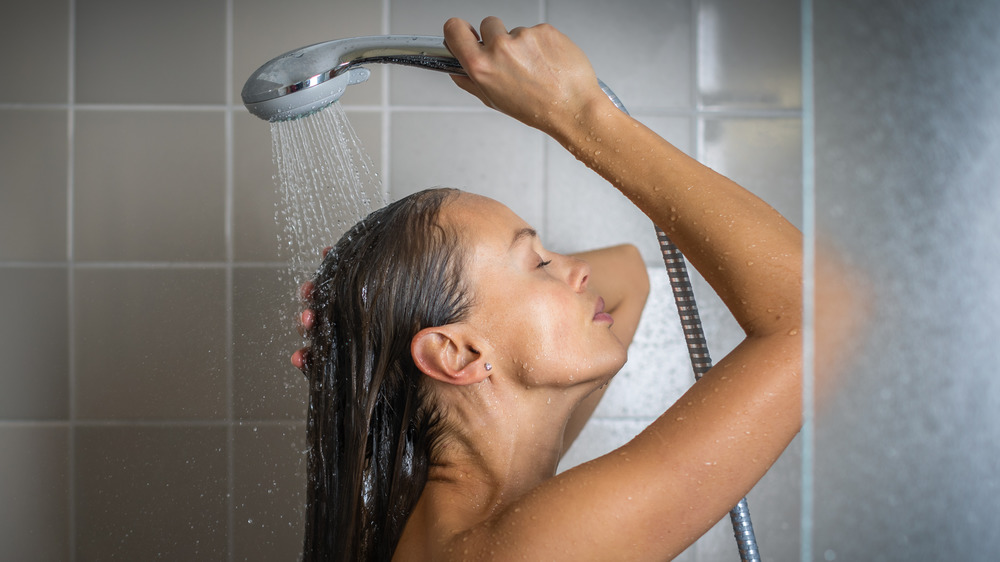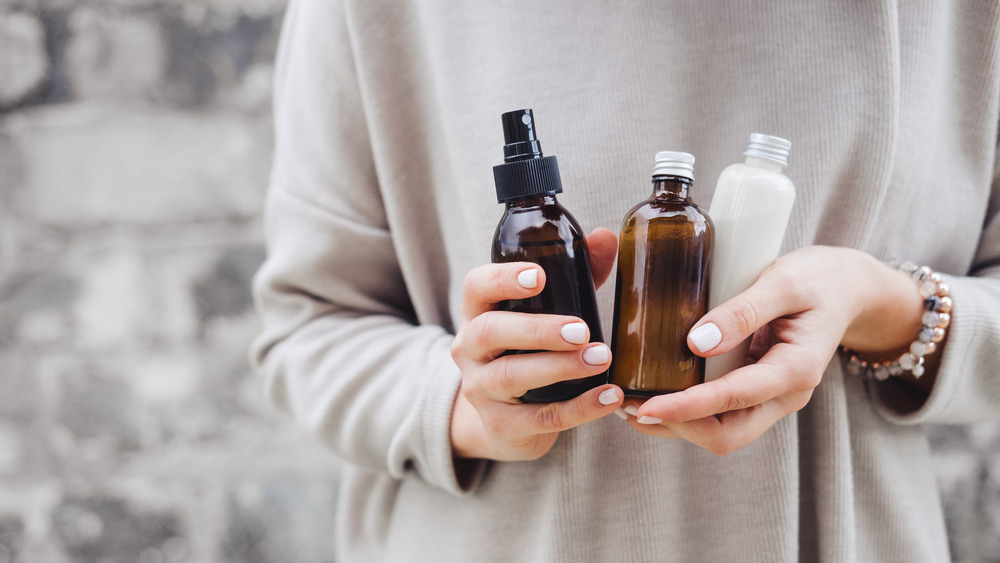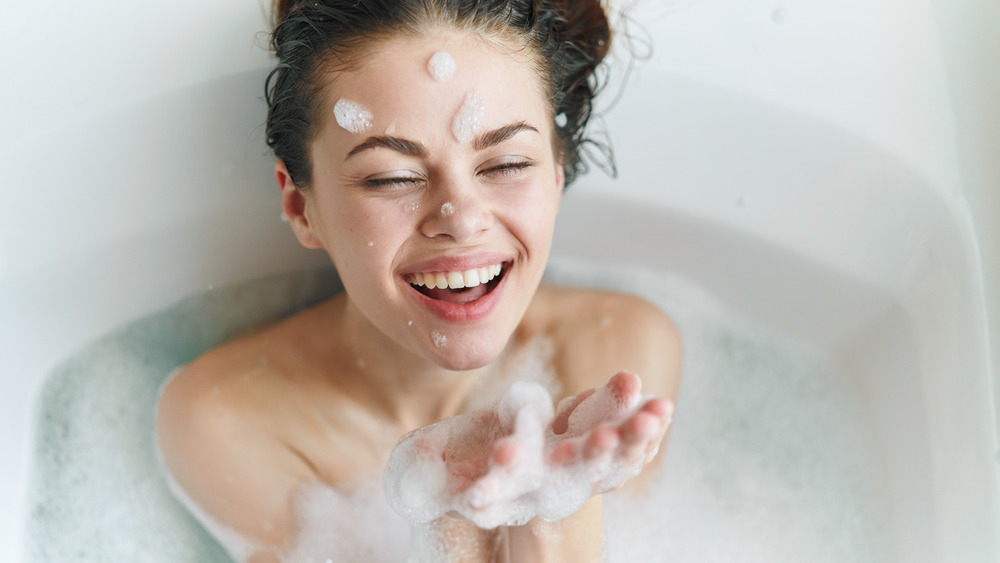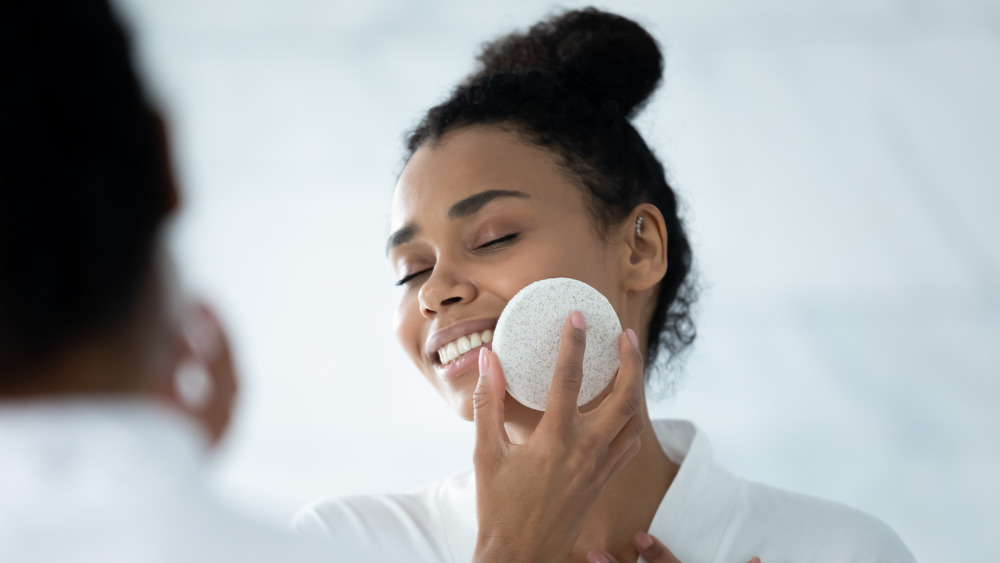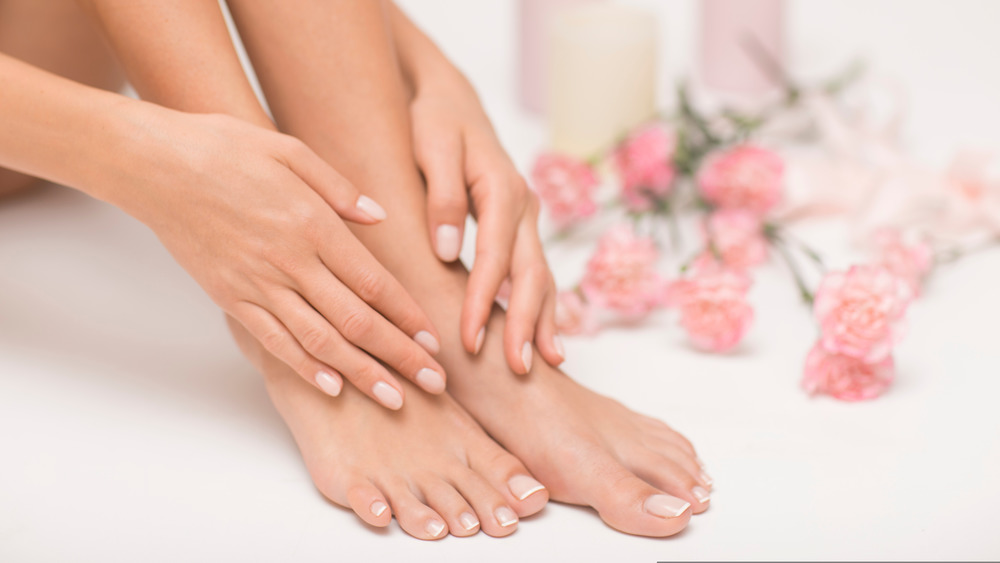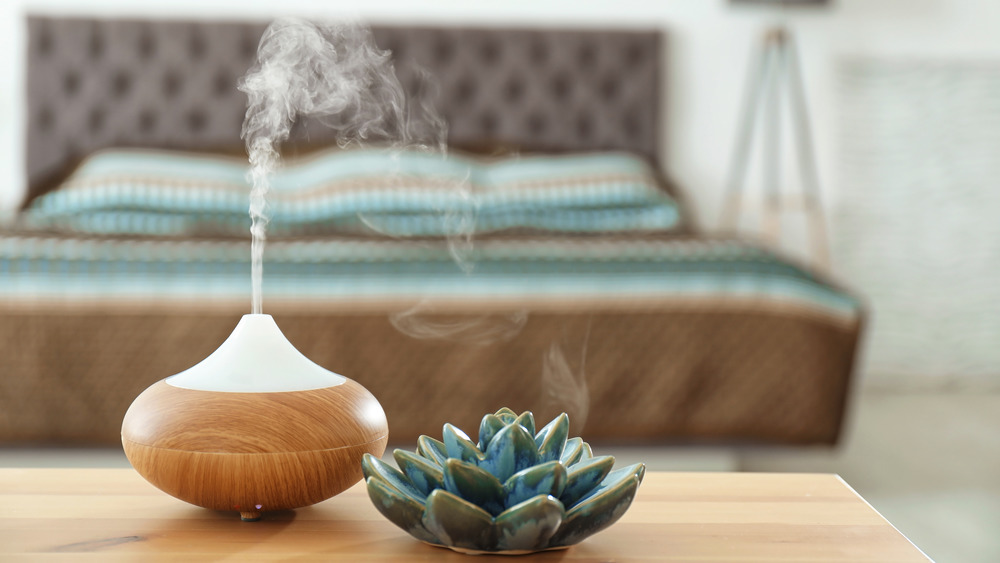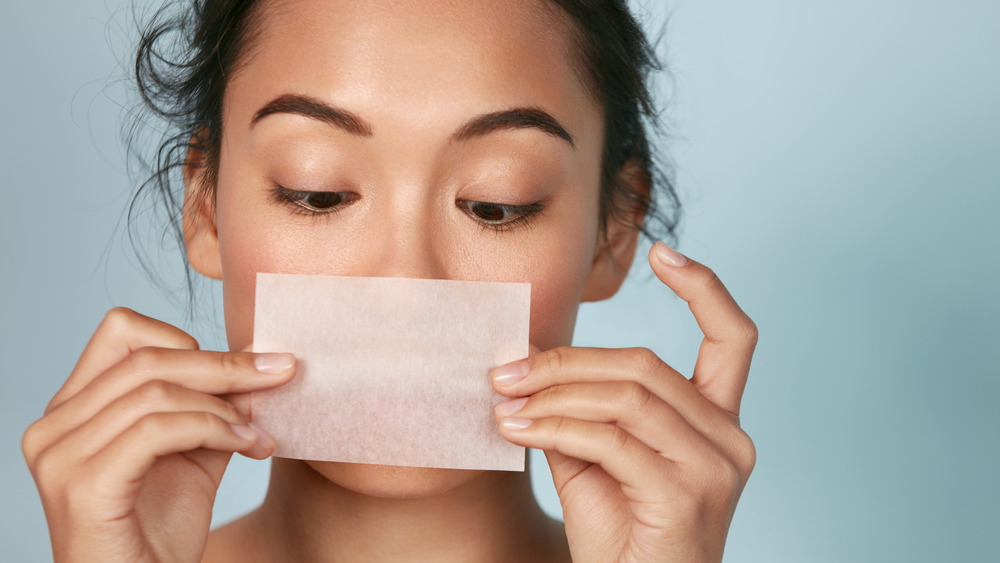The Biggest Winter Skin Mistakes Everyone Makes
What are the biggest winter skin mistakes everyone makes? Baby, it's cold outside. You can feel it in your bones — and on your skin.
Yes, the winter chill can wreak havoc on your precious, delicate skin, leaving you feeling dry and itchy — not to mention looking dull, patchy, and chapped (via Harvard University). But before you dejectedly give up on having a radiant, moisturized face (and a smooth-as-butter body) this long and dreary season, take some time and heed our tips. Your skin does not have to pay the price for living in a freezing climate, or staying in your toasty, heated home now through the end of March.
However, the truth is you're probably making some major beauty and skincare mistakes during winter. Fortunately, they can easily be remedied; a few simple adjustments to your daily routine may help you keep your dewy glow year round. So get out your humidifier and reach for your moisturizer, as we've got your back — and epidermis — covered this winter. Read on to learn about the biggest winter skin mistakes everyone makes
If you take long, hot showers in winter, your skin will dry out
When it's absolutely frigid in your house, you may find yourself tempted to hit the shower and turn up the water temp. It feels so good warming up your body under that steaming hot stream; you could luxuriate in that there until the hot water runs out.
But, while blasting your skin under hot H20 for a while may make you feel toasty, it's a mistake for your sensitive skin. Dermatologist Dr. Dhaval G. Bhanusali told Allure that "showering for too long makes you more dry by stripping the 'good' oils from your skin." Furthermore, dermatologist Dr. Shari Marchbein echoed this statement, explaining that in the winter months, "we are all more prone to itchy, dry skin thanks to a decrease in natural humidity. Unfortunately, "the hot water in showers...draws moisture out of the skin" even more.
It might sound way less satisfying, but, when winter weather hits, keep the water temperature lukewarm. Or if you're bold, try cold showers, as they can change your life! Your moisturized skin will thank you.
Don't wait too long to moisturize your skin in winter
If you get out of the shower, dry off, blow out your hair, and then go about your regular business, you're missing out on one very key step to help keep your skin healthy, happy, and hydrated during the cold and drying winter months.
To prevent making that skin mistake, dermatologist and cosmetic surgeon Dr. Michael Kaminer told Skincare.com that it's best to apply your moisturizing body lotion immediately upon exiting the shower. No time like the present, so pat yourself off a bit, and then start rubbing. "Your skin has the most moisture when it's wet, and most moisturizers work best when skin is already hydrated," he explained.
Furthermore, it's extra important to apply lotion if you've just shaved, as the hair-removing process provides natural exfoliation and reveals new skin. And be sure to be extra generous with any areas that have thicker skin — like elbows and knees — as these spots tend to get especially dry. The bottom line is that moisturizing helps to keep your epidermis protected.
Using the same skincare products in winter and summer is a mistake
We all have our own preferred go-to skincare products, and it can be hard to part ways — even temporarily — with a favorite lotion, oil, or cleanser. But your skin needs a new skincare routine in winter, so don't make the mistake of using the same products all year.
Dermatologist Dr. Jennifer MacGregor told Refinery29 that it's important to swap out your cleanser when the weather gets especially cold, replacing it with one that is "cream or oil-based" that specifically works to keep your skin hydrated. What's more, the dermatologist suggests finding a moisturizer with skin-feeding "ceramides and ingredients that protect the skin — like petrolatum and dimethicone." These actively work to keep your skin's moisture locked in.
While you're making product changes, replace your usual scrubbing exfoliator with a gentler alternative containing Alpha and Beta Hydroxy Acids. And, whatever you do, swap your light moisturizer out for a richer, creamier version that boasts "fatty acids, squalene and ceramides." These key ingredients can help keep your skin barrier protected, preventing dryness and promoting natural moisture (via Harper's Bazaar).
If you use too much soap in winter, it can disrupt your pH balance
We have been trained that suds, bubbles, and foam equate to cleanliness. But that's not necessarily the case.
According to Healthline, body soap is usually superfluous. All we really need is plain old H20; it gets rid of dirt without robbing your skin of those oh-so-important natural oils. Since your skin is especially prone to dryness in winter, it might be the right time to try doing away with body wash altogether and going back to basics.
Still not convinced soap is a skin mistake? Here's another argument to consider: soap can disrupt the delicate pH balance of your skin and get rid of the good bacteria your body needs. Nevertheless, if you feel like you must scrub up to clean up, try swapping your favorite bar or liquid soap for something a little more delicate in the cold months of winter — like an oil cleanser. It can "trap dirt and dead skin cells... without disrupting the oil barrier already in place."
Finally, if you're a traditionalist and need good old soap, try a natural handmade version made with shea butter or coconut oil.
Skipping the SPF in winter can prematurely age you
Most people are diligent about applying SPF in the summer months, but what really happens to your skin when you skip the sunscreen in winter? Dermatologist Dr. Darrell Rigel told Health that "skin damage is like a meter in a taxi cab. The meter only goes forward, and the more you drive and the faster you drive, the faster the meter goes." In short, UV exposure is a skin mistake, regardless of the weather conditions — and it all adds up.
You might not get a sunburn in January, but unnecessary sun exposure could result in early aging and dark spots. Depending on where you are, though, you might not need as strong of a sun protection factor as you would in the sunnier, summer months.
It's all relative to location — are you still able to sunbathe in February, or are you actively skiing on a mountain top? Either way, you'll want to be extra vigilant. If it's cold and dreary where you are, though, you can probably get away with using a moisturizer with built-in SPF, as recommended by Dr. Rigel. Just make sure you don't forgo protection altogether.
Exfoliating too much or too little in winter is a common mistake
If your skin is especially parched in the winter, it's extra important to keep up with an exfoliating routine. Gentle exfoliation helps you remove dead skin cells bring new ones to the surface. What's more, exfoliating goes hand-in-hand with moisturizing; getting rid of that unhealthy top layer will enable your lotion to do its job more effectively (via Birchbox).
Of course, there's always a fine balance in skincare. As noted by Self, making the mistake of over-exfoliating at this time of year can be just as harmful; scrub too aggressively or use a harsh product, and you could disrupt the skin barrier you need. To this end, try to steer clear of scrubs with "shells, husks, seeds, or other jagged pieces."
Dry brushing, which actually works, is another alternative to traditional exfoliators. Brushing your body gets dry, dead cells off, and fosters your skin's natural oil production (via Healthline).
If you skip pedicures in winter, your feet will suffer
We support the idea of giving your little piggies a rest after months of pedicures, polish, and sandals. But don't make the mistake of eschewing proper foot care in the winter — even if your feet will be in Uggs all season.
Podiatrist Dina Gohil explained in Cosmopolitan that "as the temperature fluctuates the skin is left hot or cold. When your feet feel cold, it means the skin's blood supply to the top layers of the skin have been reduced to preserve heat." This can result in extremely chapped and dry, heels, feet, and arches. Furthermore, thick socks, and boots can restrict the blood supply to your feet.
So what should you do this winter to keep your feet feeling fabulous? Gohil suggests keeping your regimen simple: use olive oil and sea salt to exfoliate and moisturize. And if the skin on your feet gets itchy from being bundled up, soak it in a solution of warm water and apple cider vinegar. That can improve "fatigued feet, fungal toenails and athlete's foot." Avoid this, though, if you have exposed cuts or diabetes.
Forgetting to moisturize your poor lips in winter is a common skin mistake
Winter is especially rough on your delicate lips, so to keep your kisser in prime condition, make sure you pay them some mind.
Dermatologist Dr. Melissa Piliang of the Cleveland Clinic explained that "lips are a special type of skin that is very thin and delicate." Additionally, "lips dry out 10 times faster than the rest of the skin on our face, so it's really important to use extra protection." Luckily, the doc has some simple tips to help you avoid making lip mistakes. First: don't lick them. No matter how tempted you may be to moisten them with saliva in the dry indoor heat, keep that tongue inside your mouth, and turn to a calming balm instead — preferably one with "petrolatum, essential oils or glycerin," and a built-in SPF.
Dr. Piliang also advises treating dry lips as soon as you feel that tell-tale tingle so that the issue doesn't worsen, or cause a cold sore for those prone to getting them. "Try to add lip protection as a part of your morning, bedtime and being outdoors routine." Your favorite smooching partner will be thankful.
Don't make the mistake of ignoring your hands in winter
Your hands can take quite the hit in winter if you make the mistake of ignoring them. In addition to the dry heat inside and the cold air outside, you're probably washing your hands too much, which also causes problems.
Dermatologist Dr. Ellen Marmur told WebMD that she seems dry hands in her practice all the time. "People will have fissures in their hands and they'll come to see me saying they can't figure out what's happening," she explained. "It's just extremely dry skin." So how can you avoid getting scaly hands this winter? "The best prevention is to begin using a moisturizer before your hands show signs of dryness," says Dr. Marmur.
What's more, once a day isn't going to cut it in the frigid months; you'll want to moisturize your hands at least five times a day. Dr. Marmur advises choosing a moisturizer that has emollients to lubricate the skin and humectants to foster water content on its surface. Finally, if you're going to be out and about, wear gloves or mittens to protect those precious paws of yours.
If you don't drink enough water in winter, your skin will dry out
You most likely remember to drink plenty of water in hot weather. However, in winter months, you might make the mistake of under-hydrating; to that end, here are signs you're not drinking enough water.
The fact is: it's just as critical to drink your H20 (and lots of it) during the winter. According to the European Hydration Institution, "body fluid losses can be as high as those in hot climates because of high rates of energy expenditure, use of heavy clothing, and increased losses in urine." Thus, your water intake should not decrease when it's cold outside.
While hydration is important for your overall health, it can also keep your skin looking and feeling its best. According to Dr. Steven Deliduka of Forefront Dermatology, "without adequate water intake, skin appears duller, and wrinkles and pores more prominent. Proper hydration levels help the skin to become plump and improves its elasticity." In other words, make sure you drink up — even if you don't feel hot, sweaty, and parched. Your body — and skin — need it.
Forgetting your humidifier in winter is a common skin mistake
Don't have a humidifier running in your bedroom in winter? You are making a huge mistake when it comes to your skin.
Dermatologist Dr. Paul Jarrod Frank explained to Allure that "a humidifier allows us to control the environment, which is a great way to control the skin." As "skin is our largest organ, and heat is naturally very drying... it's important to keep air hydrated." Yes, a humidifier works to add moisture to your otherwise dry and stuffy indoor environment. Since artificial heat can be especially offensive to the skin (on top of the effects of cold outdoor temperatures and frigid winds), a humidifier can help counteract some of these negative aesthetic consequences, and keep your skin barrier hydrated and healthy.
What's more, consider this: a humidifier will do more than help your skin, as it can also hydrate your entire body. And if you perpetually wake up feeling congested? Some pumped in moisture might help.
If you neglect your scalp in winter, it may get too dry
Your scalp is affected by cold weather and artificial indoor heat in winter just like the rest of your skin. According to hairstylist Justine Marjan, if your scalp feels itchy and dry, it's most likely because the dead skin cells are over-producing due to a pH imbalance. "Fortunately, you can address this issue without much effort," she told Shape. "Just find yourself a moisturizing conditioner with rich oils that will hydrate and nourish your scalp, and be sure to apply the product directly onto your head." Furthermore, Marjan said you can also blot a bit of "aloe vera or cider vinegar onto your scalp with a cotton pad to help balance pH levels."
If you have dandruff, you'll need to take treatment a step further. As explained by dermatologist Dr. Francesco Fucsco, there's an important difference between dandruff and dry scalp — the former is actually yeast that has accumulated on your scalp. Don't panic; just find a shampoo with Zinc pyrithione. This key ingredient will both hydrate your scalp and fight dandruff.
Don't the same foundation in winter and summer
Just as you need to change your skincare routine every year, your makeup must-haves need a refresh for the winter months, too. To that end, it's time to swap out your face makeup and foundation, lest you make a common skin mistake.
First and foremost, you probably need a different shade of foundation in winter. Your skin was likely a bit tanner in the summer (even if you diligently applied SPF daily). You now need a hue that's a bit — how do we put this kindly — paler (sorry, it's the truth.) Don't believe us? Here's how to find the right shade of foundation for your skin.
Then there's the whole texture issue. In winter you want a foundation that has built-in hydration to keep your skin supple, healthy, and radiant despite the cold dry air and artificial indoor heat. What's more, by upping your skincare and makeup game, you'll look better all season long. A rich moisturizing cream will act as a good base to keep your foundation looking fresher, more natural, and smoother this winter (via Self).
Don't assume that having oily skin means you don't need to moisturize
If you have oily skin, you might think you're in the clear for winter — perhaps you believe you don't need to add additional hydration to your routine. But that's a mistake.
Esthetician Renée Rouleau told Elle that, yes, you should be using moisturizer if you have oily skin during the winter months, as "water-based hydration" helps to stop "the skin from pushing out more oil due to water loss." In other words, not moisturizing properly could backfire and make your skin even oilier. One key takeaway: look for the words 'oil-free' in your product picks. Rouleau also advises against using a moisturizer with alcohol — which can majorly dehydrate skin — or with petroleum, which can cause breakouts.
While your skincare products may need to change, Dr. Jennifer MacGregor told Refinery29 that your exfoliating habit should not. She recommends getting rid of those dead skin cells, but also suggests swapping out your aggressive exfoliating serum for a mild cleanser containing alpha hydroxy acids and retinols, instead. This will get the grease under control without causing irritation.

